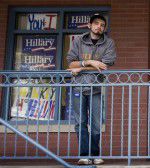Campaigning on campus: ‘Nova gets ready for ’08

June 29, 2008
If you haven’t noticed already, election season – particularly the race for the presidency – is in full swing. When you open a newspaper, there’s Hillary Clinton’s face; flip on the TV and Rudy Giuliani is on the cell phone with his wife during a press conference. There are polls, flyers, signs and even a good amount of sidewalk chalk (perhaps on a certain candidate’s advocacy for Internet porn, as many Villanovans have witnessed).
How ever the media is coming at you, one thing is clear: Villanova students want in. Those interested in politics, namely the members of the College Republicans and College Democrats, will be putting their two cents into the University community right up until general election time in November.
While both clubs often help local politicians with their campaigns, a presidential election will give them a chance to rally support and awareness for issues and candidates on a much different scale. Most Villanova students have not yet had the chance to experience a presidential election while in college.
“It’s new territory for everyone around,” said Zandra Leahy, junior College Republicans president. She is excited to see what students come up with in terms of campaigning as the year goes on.
Both clubs have been successful in drawing campus attention to politics through their debates. After deciding on an issue to discuss, the Republicans and the Democrats hold an independently moderated debate open to their club members and the entire Villanova community. While perhaps not agreeing on the issues, both sides feel the debates have succeeded in reaching students.
“Once the debate was over, it was opened for people to ask questions,” Leahy said. “It is a good way to participate without being one of the debaters.”
Tom Nardi, a senior member of the College Democrats leadership board, remembers how after taking a poll at the end of last semester’s debate, it was determined the Democrats had lost. However, to him, any interest in the debate proved important.
“The most valuable thing is audience feedback,” he said. “It’s really just to get the issues out there. If we get the issues out, we’ve won.”
And it is here that the clubs’ concerns with the presidential election seem most concentrated: the issues, rather than any candidate. Both groups want to make the campus aware of the concrete ideas at stake in the election and the importance of voting next year.
While the College Republicans are familiar with passing out literature, wearing buttons and working the polls at election time, Leahy said the club has a few more proactive ideas for getting the issues noticed on campus this campaign season. Ideas from other colleges inspiring the club’s own campaigning include an affirmative action bake sale and a global warming beach party.
She hopes events and fundraisers will “spark conversation about things people need to be aware of.”
Leahy believes students and the nation in general will be more receptive to campaigning in such a pivotal election year and wants to make sure Villanova students know how to reach the polls. She said the club will focus on making sure students are registered to vote and also know how to use absentee ballots.
The College Democrats have similar views, as they continue to strive to make their club and ideas a bigger presence on campus. Already this year, the club has sponsored a debate-watching party for the most recent Democratic debate and is looking to bring a speaker to campus.
“We’re also trying to do a newsletter either monthly or bi-weekly about what Democrats all over the country are doing,” said senior College Democrats leadership board member Nichole Develin. “We’re looking to cure some of the apathy on campus.”
Nardi concurred, saying he would rather have a campus that was 60 percent Republican and 40 percent Democrat than the 50 percent apathetic population he sees now at Villanova.
An issue of political interest and power on campus the club hopes to address in the future is how Villanova’s voting district is split in half – leaving students confused on where they can register and who they are voting for, Develin said.
“If we weren’t split up, I think we’d be a driving political force,” she said.
For right now, though, the College Democrats hope to get people thinking about the issues and filling out absentee ballots.
One instance of political prominence on campus is of course the colorful chalkings in support of presidential candidate Ron Paul. While surprising to the whole campus, including the College Republicans and College Democrats (both of which claim no involvement in the act), both recognize the outburst as good political awareness from a campus that doesn’t often display it so readily.
Nardi called the event “jarring and weird” but believes it would not be so off if such strong endorsements were something that happened all the time.
Develin concurred, saying she is “all for making Villanova more political.”
Leahy was just as surprised, noting, “You don’t see political action for one candidate – more for issues.” She does, however, recognize Paul’s apparent ability to reach college students – a task both clubs understand the importance of.
As the year goes on, Villanova students should be on the look-out for campaigning from their peers, and the College Democrats and College Republicans hope for a good reception.
Coming up at the end of November, another inter-club debate will be held, centering on a domestic issue; the groups have been discussing the possibility of a debate on health care. And both groups welcome interest from students at any time. Develin in particular advises students to explore the parties and the respective clubs’ interests.
“Go stop in on a meeting and decide where you belong,” she said.

